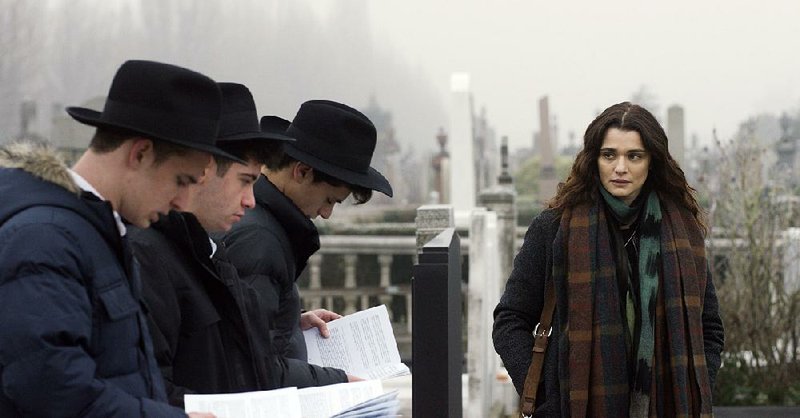The phrase "May you live a long life," sounds like a blessing, but might be uttered as a curse. It isn't exactly a welcoming sound when it's pronounced by stern men in black and women in wigs to the rabbi's estranged daughter (Rachel Weisz) who, in the wake of his death, has returned to the north London Orthodox enclave she fled many years.
Ronit -- who goes by Ronni back home in New York, where she leads a bohemian life as an arty downtown photographer with the requisite interests in drugs, sex, ice shaking and presumably rock 'n' roll -- was more or less dead to them; even the newspaper obituary pointedly states that the rabbi left no children. No one is exactly sure how she found out about her father's passing, though Dovid (Alessandro Nivola), her friend and devoted student of the rabbi (actually a Rav, a rabbi with more training in providing guidance related to the practical aspects of Jewish law) is at least glad to see her.
Disobedience
83 Cast: Rachel Weisz, Rachel McAdams, Alessandro Nivola, Anton Lesser, Bernice Stegers, Allan Corduner, Nicholas Woodeson, Liza Sadovy, Clara Francis, Mark Stobbart, Caroline Gruber
Director: Sebastian Lelio
Rating: R, for some strong sexuality
Running time: 1 hour, 54 minutes
Ronit and Dovid were teenage buds, along with Esti (Rachel McAdams). There's an easiness between Ronit and Dovid, she teases him when she discovers he's married. Who's the lucky girl? Wait? Surely not Esti?
Ronit's reluctance to accept this partnership seems odd yet familiar. Maybe it seems a violation of the old code, as it puts the power triangle out of balance. Esti, depressively meek, seems resentful at first -- when Dovid insists Ronit stay with them, Esti snappishly tells her "she can do what she likes." But deep down, she's happy to see Ronit too.
It's not really a spoiler to say it was Esti and Ronit who were something more than friends back in the day; the freighted looks that pass between them cue us in pretty fast. Dovid might have been too busy with the Torah to notice, or he might simply be a generous soul who trusts his wife and her old lover to behave under his roof. He obviously didn't have the benefit of seeing either the film's trailer or poster.
Yet, other than a certain staid stateliness, there are few surprises in Disobedience, which offers some excellent performances and a little bit of intellectual cud to work through. It opens with the Rav (respected British actor Anton Lesser, primarily known for his Royal Shakespeare Company work and Game of Thrones) imparting the lesson about humanity's unique ability to make moral choices that serves as the drama's key note. (Then he drops over dead, and out of the way.)
Dovid is his logical successor, but the entire community seems to know about the incident that led to Ronit's abrupt departure and sent Esti into counseling and a spiritual journey of self-abnegation. Her marriage to Dovid was engineered by the Rav -- Dovid is solid and crazy about her. She is obedient. She is perhaps miserable, but she finds joy in teaching.
Now Ronit is back to screw everything up again.
It's completely understandable why Weisz was interested in developing this material -- looking for a story with two strong female leads, she optioned Naomi Alderman's controversial novel and brought producer Frida Torresblanco and red-hot Chilean director Sebastian Lelio (Gloria, A Fantastic Woman) on board. Lelio and British playwright Rebecca Lenkiewicz adapted the book, apparently changing the ending. (I haven't read it.)
And Ronit is a juicy role, a character who is resentful but also wounded by her failure to patch things up with her father before his death. While there's a practical cover for her trip -- she wants to sell his house (and is rocked by the revelation she's not mentioned in his will) -- she also yearns to honor the old man. And once she's there, she wants to liberate Esti.
McAdams' role is, at least on paper, the more interesting. While her acting is fine -- occasionally she locks Weisz in a tractor-beam gaze that feels like genuine desire -- she feels fundamentally miscast. Her Esti feels like a naif barely out of school, while Ronit is a full-grown woman. While it's certainly possible to imagine these women playing contemporaries (Weisz is almost a decade older than McAdams but could easily play a 30-something), Esti looks like she could be her daughter.
Furthermore, the filmmakers overdo Esti's mousiness, saddling her with a risible ill-suited wig. And throughout most of the film she wears an affectless expression that we took to calling her "worried Chow" look. She tries, but she never looks like anything other than a beautiful woman costumed as a frumpy Orthodox housewife. (Esti's look drew some complaints from the real Orthodox community in which the film was set -- to them the character seemed a caricature.)
The secret hero of the piece is Nivola as Dovid, who could have been come off as an oppressor or a clueless chump. Yet in some ways he's the most sympathetic character in the movie, a man of genuine faith struggling to understand how and why he should acquiesce to what he's been taught is an unnatural and dangerous desire on the part of a woman who really loves him, just not like that.
May all of them live long. And well.
MovieStyle on 05/18/2018
